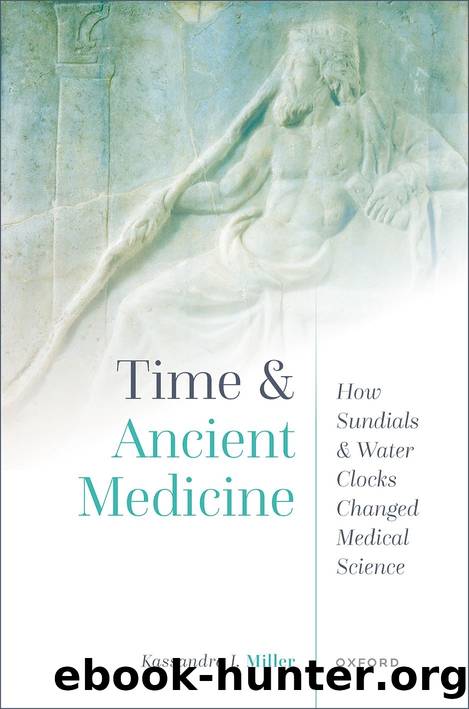Time and Ancient Medicine by Kassandra J. Miller;

Author:Kassandra J. Miller; [Miller, Kassandra J.]
Language: eng
Format: epub
ISBN: 9780198885191
Publisher: Oxford University Press USA
Published: 2023-07-25T00:00:00+00:00
Part II
Hours in Action
5
From âSeasonâ to âHourâ
Galenic Refinements of the Hippocratic HÅra
In the preceding discussion of Affections and Errors, we saw how, in Galenâs view, the process of clock-construction exemplifies his ideal scientific methodology and serves as a model for unerring truth-assessment and decision-making.1 At the same time, however, we also saw that Galen considered clocks to be tools that were not only good to think with representationally but were also âusefulâ (khrÄsimos), on a practical level, for obtaining temporal measurements. This leads one to wonder just how an Imperial-period physician like Galen might have incorporated hourly timekeeping into his day-to-day medical practice. Or, to put it another way, in what contexts did ancient Greek physicians, like Galen, feel that numerical exactitude, down to the level of the hour, was important for successful diagnosis, prognosis, and treatment?
Chapters 5â7 explore Galenâs engagement with this question across a variety of his medical works. Chapter 5 begins by investigating how Galen, in On Critical Days, uses hourly timekeeping to chart the course of febrile illnesses with greater precision and improve his ability to predict their outcomes. From this analysis, the picture that emerges of Galen himself is that of a doctor who advocates for numerically exact timekeeping. Chapter 6, however, offers an important corrective to the impression that Galen promoted such exactitude across the board. In that chapter, we will see that Galen actually sought to position himself as a moderate within an active, contemporary debate over the degree to which physicians should rely on numbers in their daily medical timekeeping. By examining passages from Galenâs works on irregular intermittent fevers, medical definitions, and venesection, it will become clear that Galen held strong views about which diagnostic, prognostic, and therapeutic contexts were benefitted by close attention to hourly timekeeping and which could, instead, be harmed by it. Finally, Chapter 7, through close readings of passages from Galenâs On Hygiene, presents and dissects some of the rationales that underlie Galenâs decisions about when hourly timekeeping could be medically beneficial. Chapter 7 reveals that, for Galen, the utility of this kind of timekeeping is contingent not only upon the nature of the disease confronting the physician and the kind of procedure he is trying to perform, but also upon the very nature of the patient in question: specifically, his or her age, health, habits, preferences, and physical capacities. Taken together, Chapters 5â7 demonstrate that Galenâs decisions about when and why to employ hourly timekeeping in the sickroom are intimately related (a) to his scientific methodology and admiration of the mathematical sciences; (b) to his theories about how to define health, disease, and a medical kairos; and (c) to his deep-seated desire to portray himself as the successor (and refiner) of that paragon of Classical Greek medicine, Hippocrates.
In On Critical Days, the focus of the present chapter, Galen seeks to assess and justify Hippocratic âcritical-dayâ schemesâthat is, schemes for anticipating important moments of change in the course of febrile diseases. This text, I argue, highlights how
Download
This site does not store any files on its server. We only index and link to content provided by other sites. Please contact the content providers to delete copyright contents if any and email us, we'll remove relevant links or contents immediately.
| Central Africa | East Africa |
| North Africa | Southern Africa |
| West Africa | Algeria |
| Egypt | Ethiopia |
| Kenya | Nigeria |
| South Africa | Sudan |
| Zimbabwe |
Goodbye Paradise(3446)
Men at Arms by Terry Pratchett(2681)
Tobruk by Peter Fitzsimons(2374)
Arabs by Eugene Rogan(2193)
Pirate Alley by Terry McKnight(2126)
Borders by unknow(2117)
Belonging by Unknown(1729)
It's Our Turn to Eat by Michela Wrong(1590)
The Biafra Story by Frederick Forsyth(1558)
Botswana--Culture Smart! by Michael Main(1482)
The Source by James A. Michener(1455)
A Winter in Arabia by Freya Stark(1447)
Gandhi by Ramachandra Guha(1429)
Coffee: From Bean to Barista by Robert W. Thurston(1419)
Livingstone by Tim Jeal(1391)
The Falls by Unknown(1371)
The Shield and The Sword by Ernle Bradford(1310)
Africa: Altered States, Ordinary Miracles by Richard Dowden(1292)
Egyptian Mythology A Fascinating Guide to Understanding the Gods, Goddesses, Monsters, and Mortals (Greek Mythology - Norse Mythology - Egyptian Mythology) by Matt Clayton(1278)
